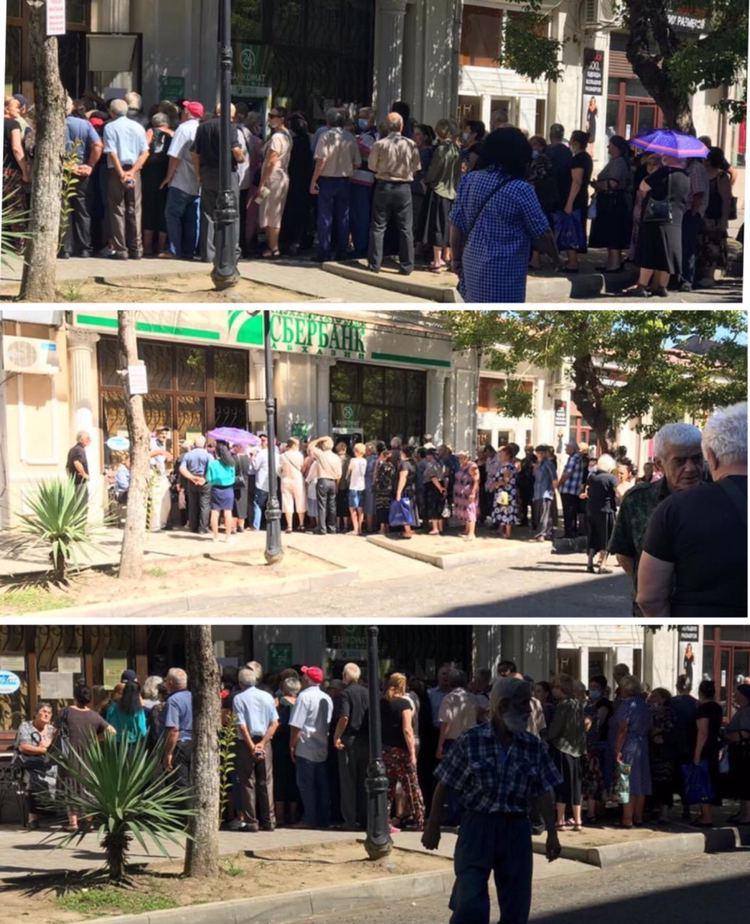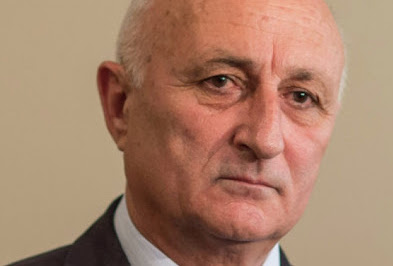Abkhazia: pensioners suffering after pensions move from ATMs to banks due to fraud cases
Since August 2020, residents of Abkhazia who receive a pension from Russia have been unable to do so via an ATM, and instead need to queue at bank branches.
The Abkhaz authorities made this decision because there was a widespread practice of people receiving pensions for deceased family members using bank cards.
As a result of the tough measures, many Abkhaz pensioners are now suffering.
Need money for medicine? Get in line
Odik Kakalia is a pensioner, every month on about the same day at the same ATM he withdrew his pension and the pension of his mother, who has not left home for almost a year after a hip fracture.
He came a few days after the payments were calculated so as not to stand in line. After a heart attack, a man cannot be on his feet for a long time.
Op-ed: difficult times ahead for economy of Abkhazia
Tkuarchal, Abkhazia – former coal capital trying to survive
Anti-crisis farming: two stories from Abkhazia
“I don’t need to receive my pension exactly on a certain day. I work, so by the time I receive my pension I don’t run out of money at all, but there are very old people whom no one helps, when I see how they queue up in the morning to buy bread for themselves – my heart is torn apart,” says Kakalia.
But now, when the Abkhaz ATMs stopped serving pension cards and pensioners have to go to the bank to receive their benefits, the situation has changed for those who could postpone receiving their payments.
Russia pays pensions to its citizens living in Abkhazia.
The decision to transfer pensioners to the service of banks was made jointly by the Russian pension fund and the Ministry of Social Security of Abkhazia.
The Russian pension fund calculated that since the last re-registration of pensioners (and it takes place every 10 months), 17 million rubles (about 225,000 dollars) have been illegally issued in Abkhazia.
The cash desks of the Abkhaz Sberbank set a schedule for receiving pensions. For three days pensions are given to those born in the 1930s, then the 1940s and so on.
The issuance of pensions takes weeks.
And every day there are queues in the branches. Due to restrictive sanitary measures, a strictly defined number of people are allowed into the bank building. Everyone else stands out in the heat.
“Both me and my mother each month need to buy a certain set of drugs that are prescribed for life. It is impossible to postpone taking them, blood counts immediately deteriorate. To buy them on time, you need to go for a pension. To get it, you have to stand in line, which is also not safe for old people’s health,” says Odik Kakalia.
Additional chores
Lolita Zade, head of the Sberbank subsidiary branch in Sukhumi, was very enthusiastic in the early days of issuing Russian pensions. There was no influx of people and the cashiers managed to serve customers without creating queues.
“We started to open an hour earlier, which made our clients very happy. Of course, first getting used to ATMs, and then weaning the pensioners off them, is very traumatic for the elderly, but what to do, this is also a problem for us. Our work as operators has increased, but the salaries are the same,” says Lolita Zade.

Not only the procedure for issuing pensions has changed, but also for calculating pensions.
Previously, according to the schedule, benefits were accrued one after another by district.
For example, the first of Sukhumi, the fifth, Gudauta and so on. Now, all pensioners of the republic are paid on the same day.
In order to relieve the burden on Sberbank branches issuing pensions, additional offices were opened from September 1 – two in Sukhum, one in Gudauta and another in the village of Bzypta.
The bank’s press release says that “the maximum number of Sberbank employees will be involved in the process of issuing pensions.”
Not all retirees have experienced the stress of moving from ATMs back to checkouts. Rimma Aiba, for example, having received a plastic card, many years ago, never used it. She could not adapt to ATMs and payment terminals.
“I come to the girls every time. I’d chat with them, find out the news. I love them and they love me. And while you are standing in line, you can learn a lot of interesting things. Chat. And let young people go to ATMs,” says Rimma Aiba.
More bureaucracy
A shock for many was the news that in order to receive a pension for a relative who does not have the ability and strength to go for a pension in person, a power of attorney is needed whose term is 10 months.
Rita Samsonia receives her pension, that of her mother and her paralyzed husband. She plans her monthly spending on the basis of the total amount that is obtained by adding up all three pensions.
Now, she says, the entire financial schedule has collapsed.
“Not only have I been fiddling with powers of attorney for several weeks, but now I have to queue three times a month. For our family, this is just a disaster,” says the pensioner.
Critics of the authorities on social media argue that in a state governed by the rule of law the government would have found the guilty parties – those who withdrew the benefits of deceased pensioners, and not shift the blame and punishment onto the elderly entirely.
Comments

“Let the authorities organize the delivery of pensions at their own expense” – the leader of the political party Aitaira Leonid Lakerbaia said on Telegram channel D News Abkhazia:
“If you want to solve this problem quickly, without delay, there is an old tried and tested method: we have decent-sized villages where you can come, and where you need to come, and bring pensions here. Why can’t we take advantage of this? After all, this was done when the country did not have such income and such opportunities.
“Never mind, at your own expense arrange for the delivery of the pension that the Russian Federation delivers on time. And let the authorities find other levers of work with those who commit these violations.”
Toponyms, terminology, views and opinions expressed in the article do not necessarily reflect the views and opinions of JAMnews or any employees thereof. JAMnews reserves the right to delete comments it considers to be offensive, inflammatory, threatening, or otherwise unacceptable


















